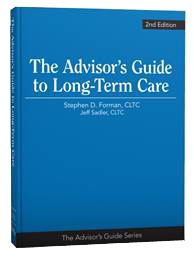 No one wants to file a claim: you only lose if you're not insured.
No one wants to file a claim: you only lose if you're not insured.
Long Term Care Fallacy: Use It or Lose It
Bob Carlson’s piece “Higher Returns on Safe Money Plus Long-Term Care Benefits” that ran in Investing Daily is an excellent review of State Life’s new indexed annuity combo product. Excellent, but for an off-hand remark dismissing standalone long-term care insurance’s use it or lose it feature. The author is hardly the first to make such a blunder. In fact, even an assembly of some of our industry’s leading actuaries published an LTCI risk and volatility analysis in which they chose the tarnished phrase “use it or lose it.”
A simple thought experiment makes it plain that if everyone who paid an insurance premium received that exact amount back at the end of the year, then no real insurance would exist, and no insurance market would be necessary (just keep your own money in the bank). But then, the point of insurance has never really been an entitlement to your exact money back, which brings us to our central question: At what point is insurance used? Is it at zero hour, when the first premium is paid and the risk is transferred, or at the last minute, when a loss is incurred and a claim is filed? I submit to you it is the former, and I’ll tell you why.
Insurance is the exchange of an uncertain, non-periodic amount (a loss) for a certain, periodic sum (a premium). Most people fundamentally understand why this makes sense, which is why they form a pool of large numbers and agree to be rated according to risk.[1] The very moment you transfer this risk of loss to your LTC insurance carrier, a number of magnificent and transcendent benefits accrue:
- You are liberated from uncertainty and fear: What would happen to my partner or children if something happens to me?
- You are free to invest more aggressively: I no longer need to save conservatively for a potential care event.
- You are liquid: How would I summon a stream of income at precisely the moment I need it, with no concern for taxes, market conditions, penalties or surrender charges.
- You can keep your promises: How can I ensure that my grandchildren, church, charity, legacy are all seen to?
- You are not subject to the whims of Congress: What if Medicare, Medicaid or Social Security are not recognizable in 30 years? What if their benefits are restricted or access is means-tested?
- You have peace in the backstop of a highly-regulated industry and a contract enforceable by law: What if I have a dispute, complaint or grievance?
- Your contributions to the risk pool have made someone else whole: Sometimes it's your turn, and sometimes it's theirs. That's why insurance works.
Each of these liberations is conferred immediately, and not one requires you to incur a loss or file a claim. In fact, the rational individual hopes never to "utilize" his insurance policy and would not pray for illness just to prove a point. Therefore, it’s silly to argue that standalone long-term care insurance suffers from a “use it or lose it” flaw any more than auto, homeowner’s, disability, short-term care, critical illness, health or any number of other lines do.
However, lest one think I discount the value of a well-paid claim, nothing could be further from the truth. I’ve been among our industry’s fiercest advocates for better claims reporting: I find it obnoxious that an agent can readily obtain his production numbers but not so easily his claims paid. I've seen clients give far too much deference to an inconsequential letter grade from a ratings agency when claims are where the rubber meets the road. Besides, it’s a much more compelling headline to boast that “the industry paid $8.2 billion in claims last year” rather than “we paid nothing, but the peace of mind we provided was priceless!”
Which brings us back to our linked-benefit brethren. All too quick to throw the use it or lose it stone, ask any of these glass houses to produce stats regarding their long-term care claims-paid and you may be left wanting. If there’s one truism in insurance, it’s that companies who don’t produce glossy claims fliers do so for one of two reasons: they either don’t have a track record to run on, or they’re not proud to run on it. If you market yourself as a long-term care solution, then this should be the most important brochure in your supply department, wouldn’t you agree?
(Mind you, LTCA markets linked-benefit products: without a doubt such solutions have a valuable role to play, and are the best recommendation for some clients. I am merely arguing that it's disingenuous to sell against traditional long-term are insurance on a "use it or lose it" basis. The insurance is always used, whether a claim is paid or not.)
Our firm has marketed long-term care insurance through five different decades—there’s hardly an objection with which we are not familiar. For someone to argue that any slowdown in sales is due to the lack of a use it or lose it feature is not only to fail to grasp today’s market dynamics but also to misunderstand the very concept of insurance itself.
[1] Insurance requires the following prerequisites a) a large group to spread the risks, b) losses which can be well-defined, c) individual occurrences which must be unpredictable or accidental, d) losses which are large enough to cause hardship, e) the chance of loss must be calculable, f) the risk of loss must not be catastrophic (ie likely to affect a great many insureds at once), and g) the cost of insuring must be economically feasible.





